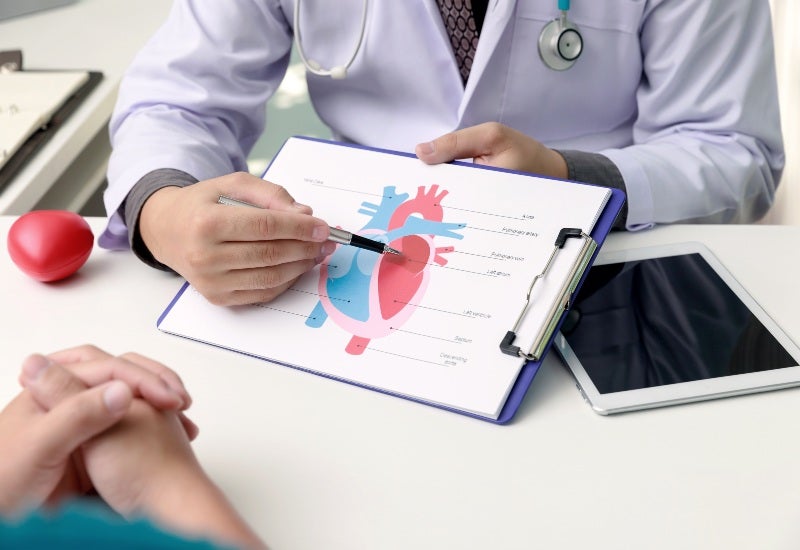Heart Disease Procedures & Tests in Sugar Land, TX
Diagnosing cardiovascular conditions in Sugar Land, TX
At Reddy Cardiac Wellness, we are passionate about diagnosing heart disease symptoms at the earliest possible stage, so we use state-of-the-art equipment to detect risks for a variety of cardiovascular conditions. The procedures listed below are some of the most common heart health tests and procedures which are offered at Reddy Cardiac Wellness.

Electrocardiogram (EKG): An electrocardiogram (EKG or ECG) is a test that checks for problems with the electrical activity of your heart. An electrocardiogram (EKG or ECG) is done to find the cause of unexplained chest pain, such as a heart attack, inflammation of the sac surrounding the heart (pericarditis), or reduced blood flow to the heart muscle (ischemia).
Stress/Treadmill Test: A stress test, sometimes called a treadmill test or exercise test, helps a doctor find out how well your heart handles work. The test can show if the blood supply is reduced in the arteries that supply the heart. It also helps doctors know the kind and level of exercise appropriate for a patient. Heart rate, breathing, blood pressure, electrocardiogram, and how tired you feel are monitored during the test.
Stress Cardiolite Test: A Cardiolite stress test takes pictures of your heart muscles and arteries (blood vessels). This test will be done while you exercise. Exercise makes you heart work harder this is a type of nuclear medicine scan that is also called cardiac imaging.
Chemical Stress Test: This test is the same as the Stress Cardiolite test but is different in that this test is designed for those who are unable to walk on a treadmill. A medicine called Adenosine will be given through an IV (intravenous) that is started prior to testing. The Adenosine makes you heart “think” that you’re exercising. This medicine does not necessary increase heart rate.
24 Hour Holter: A Holter monitor is a portable ECG recorder that you wear during your normal daily activities, including sleeping. It can be worn up to 24 hours. While you are wearing the monitor, you will be asked to keep a diary of your activities and your symptoms, such as fluttering feelings in your chest (palpitations), rapid heartbeats, and any episodes of dizziness of faintness. It’s important to keep track of the activities you were doing when your symptoms occurred, so your doctor can see what kinds of events are bringing them on.
30 Day Event Monitor: This device, similar to Holter monitor, kept in your pocket. It is used for arrhythmias that occur depress a button and the recorder is activated The monitor records the event for the 60 seconds prior to your pushing the button and up to 40 seconds after the arrhythmias is over. The rhythm can be sent immediately or saved and transmitted later, over the phone line. The technician will give the recordings to your doctor for review.
24 Hour Ambulatory BP Monitor: Ambulatory blood pressure monitoring provides a comprehensive assessment of a patient’s blood pressure profile with BP variability, overnight dipping and morning surge that in-clinic and home BP monitoring cannot provide. Patients are instructed to keep and activity log throughout the testing period for evaluation of stress, and activity-related blood pressure changes.
2D Echocardiogram: An echocardiogram (often called “echo”) is a graphic outline of the heart’s movement. Dr. Reddy use the echocardiogram to assess the heart’s function and determine the presence of disease of the heart muscle, valves and pericardium, heart tumors, and congenital heart disease.
Cardio IMT (Intima Media Thickness): Cardio IMT is a measurement of the thickness of artery walls, usually by external ultrasound, occasionally by internal, invasive ultrasound catheters, to both detect the presence and to track the progression of atherosclerotic disease.
Carotid Doppler: A test that shows the carotid arteries (vessels in the neck that provide blood flow to the brain), as well as how much blood flows and how fast it travels through them. This image can be used to find out if there is an abnormality or blockage of the car
Pacemaker Check: Evaluation of the pacemaker function, including the battery and leads (wires). This gives us more information than the evaluation done over the telephone. This visit also allows us to adjust the pacemaker to fit your changing needs.
Advanced Lipid Profile: We analyze more than 18 different risk factors and design a personalized treatment plan that are unique to each patient.
Complete Metabolic Panel: A standard suite of 14 blood tests which serves as an initial broad screening tool for physicians. It provides an important baseline of a patient’s basic physiology.
Protime & INR: A blood sample drawn from a finger stick, By careful monitoring of a patient’s Proteome, Dr. Reddy is best able to determine the safest and most effective dose of Coumadin.
*Disclaimer: These statements have not been evaluated by the Food and Drug Administration. This product is not intended to diagnose, treat, or prevent any disease. Results may vary and are not guaranteed. Please Note: The material on this site is provided for informational purposes only and is not medical advice. Always consult your physician.
